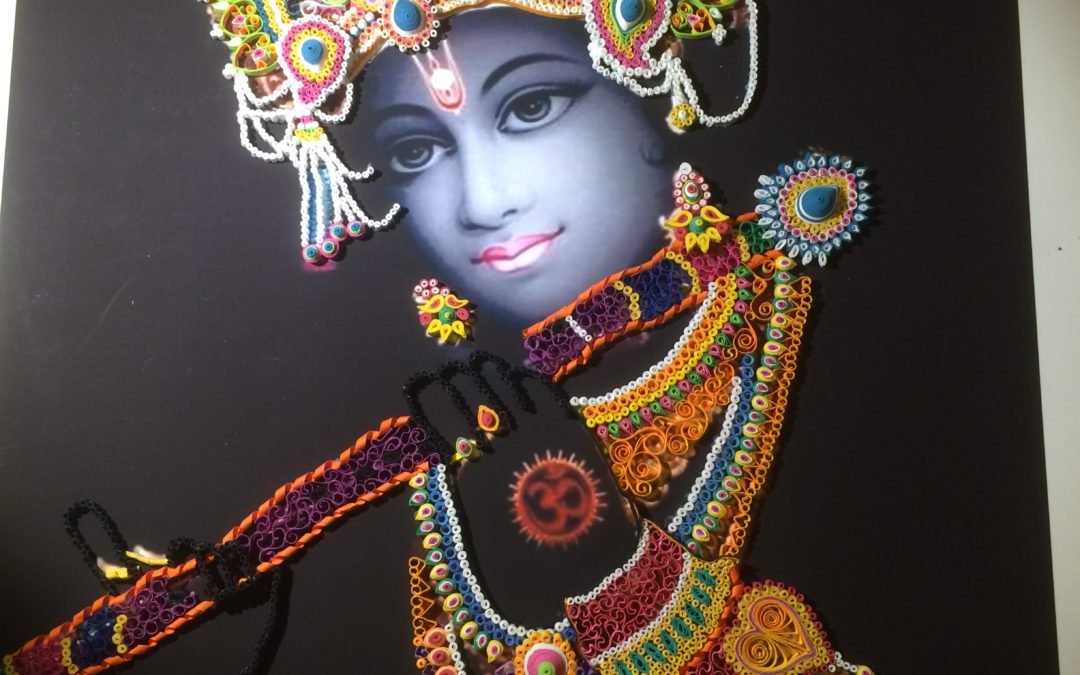Lord Krishna
Artwork by Shally Dhiman
HAPPY JANMASTHAMI
All that I learned at the lotus feet of my Vedānta teachers, illumined by the Lord within:
On this auspicious day of Janmasthami, let us remember Lord Krishna though his wonderful teachings of Bhagavad Gītā. What is your favorite verse of the Gītā? To set the ball rolling, so to speak, I will share two of my most favorite verses in the entire Gītā:
समं सर्वेषु भूतेषु तिष्ठन्तं परमेश्वरम्
विनश्यत्स्व् अविनश्यन्तं यः पश्यति स पश्यति १३.२७
samaṃ sarveṣu bhūteṣu tiṣṭhantaṃ parameśvaram
vinaśyatsv avinaśyantaṃ yaḥ paśyati sa paśyati 13.27
One who sees the Supreme Lord abiding equally as the ‘Imperishable amidst the perishable,’ that person alone sees the essential truth.
Grace Notes: For the serious, discerning spiritual aspirants, mumukshu-s, this verse contains all the essential elements to attain Self-knowledge as well as the methodology to attain the Self-knowledge. How to realize your true nature? The Lord says: cognize the “imperishable” amidst the perishable. Let’s start with the body. Is it imperishable? Then, the mind: Is mind imperishable? And the intellect: Is it imperishable? When we examine the body, mind, and intellect under the microscope of viveka, discriminating reason, we discover that they are not permanent.
Imagine when you were 5, 10, 15, 20, 30, 40,…years of age. Take out the family photo album and look at your pictures. Obviously, you do not look the same today as you were when you were 10 years old; the body has noticeably changed, some senses have become dim. But do you ever at any point doubt looking at all these pictures at various points in time that ‘this is not me.’ So, even when the body has undergone all these changes, the sense of ‘i-am-ness’ ‘the first-person subjective feeling—I Am—has not changed.’ This is the imperishable (Self) amidst the perishable (body)!
Mind and intellect have also changed similarly. You do not have the mind and intellect of a 5 year old. Hopefully not, contrary to how some of the specimens of politicians are behaving lately! J
At no point in time the sense of ‘I-Am’ in the psychosomatic apparatus has changed. So far so good!
What about the ego, the ubiquitous “me-notion?” The empirical self—jīva— the seat of what psychologists call our personality. To find out if the ego is perishable or imperishable, sages advise us that we have to resort to avasthā-traya prakriyā, the methodology of three states of consciousness—waking, dream, and deep sleep.
Let’s examine the sense of ego—the ‘me-notion’ in all the three states. Do you have the same empirical ego in waking and dream? Do you even remember it when you are in deep sleep? So obviously it changes from state to state. In waking and dream, we have two different manifestations of the ego. Do your recall remembering your name in the dream? When the dream state occurs, the waking ego is wiped out completely and vice versa. In deep sleep, we have no consciousness of our name, identity, gender or anything. So, we cannot call our ego permanent or imperishable.
However, everyone says, I am awake, I dreamt, and I slept soundly. No one can in their right mind ever doubt that the “same” person who was awake before, dreamt and slept later and then woke up again. Imagine what would be the state of confusion if a different person wakes up than the person who went to sleep! Thank goodness, we have not yet progressed that far in self-forgetfulness. So, the sense of self—I Am—has not changed. So, it is imperishable amidst the perishable ego.
Having realized through this viveka that the one undivided Self is the imperishable entity among the perishable body, prāna, mind, intellect, and ego, is to see the Supreme Lord as existing equally in all beings.
नान्यं गुणेभ्यः कर्तारं यदा द्रष्टानुपश्यति
गुणेभ्यश् च परं वेत्ति मद्भावं सोधिगच्छ्हति १४.१९
nānyaṃ guṇebhyaḥ kartāraṃ yadā draṣṭānupaśyati
guṇebhyaś ca paraṃ vetti madbhāvaṃ sodhigacchhati 14.19
When the seer beholds no one as the doer other than the guṇas and knows That which is entirely beyond the guṇas, he enters into My being.
Grace Notes: This verse presents the culmination of all the three yogas mentioned in the Gītā, like perhaps no other verse: karmayoga, jñānayoga, and bhaktiyoga. It starts with Jñānayoga: nānyaṃ guṇebhyaḥ kartāraṃ: there is no doer other than the strands of material nature, the guṇas (See also the Gita: 3.27, 3.28, 5.9-10; 13.23). How should one act, perform karma, knowing that guṇaiḥ karmāṇi sarvaśaḥ (3.27)—all actions are performed by the interplay of three properties of material nature—and that the guṇās are moving among the guṇās (guṇā guṇeṣu vartante: 3.28) or the senses are moving amongst the sense objects indriyāṇīndriyārtheṣu vartanta 5.9? The knower of the Self thinks naiva kiṃcit karomīti yukto manyeta tattvavit: 5.9: I do not do anything—senses, guṇās are in operation. Such a person places all his/her actions in the Brahman as an offering, shaking off all the attachment: brahmaṇy ādhāya karmāṇi saṅgaṃ tyaktvā 5.10. This is samanvaya of all the three yogas!
It is also important to note that seldom in the Gītā, the glory of the outcome of a spiritual practice has so explicitly been stated as it is in this phrase—madbhāvaṃ sodhigacchhati: enters into My being! This is the highest state, prākaṣthā, of bhakti. We have come full circle.
At two places perhaps in the entire Gītā, the Lord has urged Arjuna categorically how to conduct himself:
निमित्तमात्रं भव सव्यसाचिन् ११.३३
nimittamātraṃ bhava savyasācin 11.33
Be ye merely an instrument—of the Divinity—O Arjuna!
सर्वेषु कालेषु माम् अनुस्मर युध्य च ८.७
sarveṣu kāleṣu mām anusmara yudhya ca 8.7
Perform your duty, remembering Me as [the Self of all] in all and everything.
Instructions on the art of living do not come any better than this.
May the Lord grant us the blessing of the buddhiyogaṃ (10.10) by lighting up the lamp of Self-knowledge in our hearts (jñānadīpena: 10.11).


Recent Comments